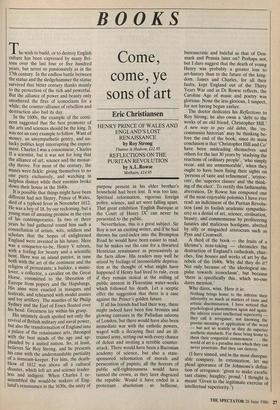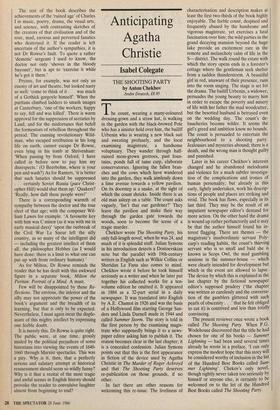BOOKS
Come, come, ye sons of art
Eric Christiansen
HENRY PRINCE OF WALES AND ENGLAND'S LOST RENAISSANCE by Roy Strong Thames & Hudson, £12.95 REFLECTIONS ON THE PURITAN REVOLUTION by A.L.Rowse Methuen, £14.95 The wish to build, or to destroy English culture has been expressed by many Bri- tons over the last four or five hundred years, but never so passionately as in the 17th century. In the endless battle between the statue and the sledgehammer the statue survived that bitter century thanks mainly to the protection of the rich and powerful. But the alliance of power and beauty only smothered the fires of iconoclasm for a while; the counter-alliance of rebellion and destruction also had its day.
In the 1600s, the example of the conti- nent suggested that the best promoter of the arts and sciences should be the king. It was not an easy example to follow. Want of money, an unsympathetic gentry, and un- lucky politics kept interrupting the experi- ment. Charles I was a connoisseur, Charles II a scientist, but it was not for long that the alliance of art, science and the monar- chy throve. For most of the century, the muses were fickle: giving themselves to no one party exclusively, and watching in helpless dismay while their enemies broke down their house in the 1640s.
It is possible that things might have been different had not Henry, Prince of Wales, died of a typhoid fever in November 1612. He was a boy of 18, by our reckoning, but a young man of amazing promise in the eyes of his contemporaries. In two or three years he had gathered round him such a constellation of artists, wits, soldiers and scholars that the hopes of enlightened England were invested in his future. Here was a conqueror-to-be, Henry V reborn, with a feeling for beauty and a scientific bent. Here was an island patriot, in tune both with the art of the continent and the religion of protestants; a builder, a music- lover, a collector, a cavalier on the Great Horse, committed to the liberation of Europe from popery and the Hapsburgs. His aims were enacted in masques and festivals, and rehearsed with model armies and toy artillery. The mantles of Sir Philip Sydney and the Earl of Essex floated over his head. Greatness lay within his grasp. His untimely death spoiled not only the revival of British military and naval power, but also the transformation of England into a palace of the renaissance arts, thronged with the best minds of the age and ap- plauded by a united nation. So, at least, believes Sir Roy Strong, and he presents his case with the understandable partiality of a museum-keeper. For him, the death- blow of 1612 was above all a cultural disaster, which left art and science leader- less and indigent. When Charles I re- assembled the would-be makers of Eng- land's renaissance in the 1630s, the unity of purpose present in his elder brother's household had been lost. It was too late.
Spiritual reformation, vigorous foreign policy, science, and art were falling apart. That great exhibition 'English Baroque at the Court of Henry IX' can never be presented to the public. Nevertheless, this is a great subject. Sir Roy is not an exciting writer, and if he had thrown his card-index into the Brompton Road he would have been easier to read, but he makes out the case for a thwarted Henrician renaissance as persuasively as the facts allow. His readers may well be seized by feelings of inconsolable depriva- tion at the thought of what might have happened if Henry had lived to rule, even if they remain stoical at the stilling of public interest in Florentine water-works which followed his death. Let a sceptic offer the suggestion that there is a case against the Prince's golden future. If all his friends had had their way, there might indeed have been fine bronzes and glowing canvases in the Palladian saloons of London, but there would have also been immediate war with the catholic powers, waged with a decaying fleet and an ill- trained army, setting out with every chance of defeat and inviting a terrible counter- attack. There would have been a Baconian academy of science, but also a state- sponsored reformation of morals and persecution of papists; all the horrors of public self-righteousness would have tainted the crown, as they later disgraced the republic. Would it have ended in a protestant absolutism as bellicose, bureaucratic and baleful as that of Den- mark and Prussia later on? Perhaps not, but I dare suggest that the death of young Henry was probably a greater loss to art-history than to the future of the king- dom. James and Charles, for all their faults, kept England out of the Thirty Years War and as Dr Rowse reflects, the Caroline Age of music and poetry was glorious. None the less glorious, I suspect, for not having begun earlier.
The doctor dedicates his Reflections to Roy Strong; he also owns a 'debt to the works of an old friend, Christopher Hill.' A new way to pay old debts, the 'ex- communist historian' may be thinking be- fore the end of the book, since its main conclusion is that 'Christopher Hill and Co' have been misleading themselves and others for the last 30 years by 'studying the reactions of ordinary people', 'who simply recur, and are unmemorable', when they ought to have been fixing their sights on `persons of taste and refinement', 'aristoc- rats', the 'superior classes' and 'the think- ing of the elect'. To rectify this fashionable aberration, Dr Rowse has composed one of the most enjoyable polemics I have ever read: an indictment of the Puritan Revolu- tion (and its foolish academic sympathis- ers) as a denial of art, science, civilisation, beauty, and commonsense by profiteering fanatics Old malicious hooligans, abetted by silly or misguided aristocrats such as Pym and Cromwell.
A third of the book — the fruits of a lifetime's note-taking — chronicles the destruction of England's cathedrals, chur- ches, fine houses and works of art by the 'rebels of the 1640s. Why did they do it? Not only because of 'the ideological im- pulse towards iconoclasm', but because `there is specifically this, which no-one dares mention.'
Who dares, wins. Here it is:
Nothing brings home to the inferior their inferiority so much as matters of taste and artistic discrimination. I have noticed that psychological phenomenon again and again: the inferior resent intellectual superiority - they call it arrogance, not knowing the precise meaning or application of the word — but not so acutely as they do superior
aesthetic standards. For those bring home to them their congenital commonness . . . the world of art is a paradise into which they can never penetrate. But they can destroy.
(I have sinned, and in the most disreput- able company. In extenuation, let me plead ignorance of Dr Johnsons's defini- tion of arrogance: 'given to make exorbi- tant claims; haughty; proud.' I thought is meant 'Given to the legitimate exercise of intellectual superiority.') The rest of the book describes the achievements of the 'ruined age' of Charles I in music, poetry, drama, the visual arts, and science, with contrasting sketches of the creators of that civilisation and of the sour, mad, envious and perverted fanatics who destroyed it. If the reader is left uncertain of the author's sympathies, it is not Dr Rowse's fault. To quote a rather `demotic' sergeant I used to know, the doctor not only 'shoves in the bloody bayonet', but is apt to 'exercise it while he's got it there.'
Prynne, for example, was not only an enemy of art and theatre, but looked nasty as well: 'come to think of it . . . was much of a Gothick gargoyle himself. When the puritans climbed ladders to smash images at Canterbury, 'one of the workers, happy to say, fell and was killed'. There is warm approval for the suppression of sectaries by Laud, and for the misfortunes that befell the formentors of rebellion throughout the period. The cunning revolutionary Wild- man, who escaped retribution in his long life on earth, cannot escape Dr Rowse, even lying in his tomb at Shrivenham: `When passing by from Oxford, I have called in before now to pay him my disrespects.' (0 Beerbohm, where is your pen and wash?) As for Ranters, 'it is better that such lunatics should be suppressed . . . certainly Soviet Russia (pace Christ- opher Hill) would shut them up.' Quakers? `Really, how daft these people were!'
There is a corresponding warmth of sympathy between the doctor and the true elect of that age; with the composer Wil- liam Lawes for example. 'A favourite key with him was C minor (as it was with me in early musical days)' upon the outbreak of the Civil War Le Sueur left the silly country, as so many of the intelligent did — including the greatest intellect of them all, the philosopher Hobbes (as I would have done: there is a limit to what one can put up with from ordinary humans).'
As for Milton, Dr Rowse reminds the reader that he has dealt with this awkward figure in a separate book, Milton the Puritan: Portrait of a Mind. A must.
Few will be disappointed by these Re- flections. The envious, the inferior and the silly may not appreciate the power of the book's argument and the breadth of its learning, but that is only to be expected. Nevertheless, I must again incur the disple- asure of this mighty intellect by expressing one feeble doubt.
It is merely this. Dr Rowse is quite right. The public were, at one time, grossly misled by the political prejudices of some historians into viewing the events of 1640- 1660 through Marxist spectacles. This was a pity. Why is it, then, that a perfectly serious and salutary attempt at historical reassessment should seem so wildly funny? Why is it that a recital of the most tragic and awful scenes in English history should provoke the reader to convulsive laughter almost from beginning to end?



















































 Previous page
Previous page